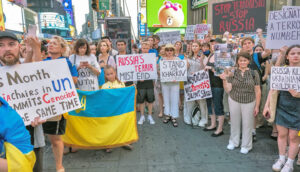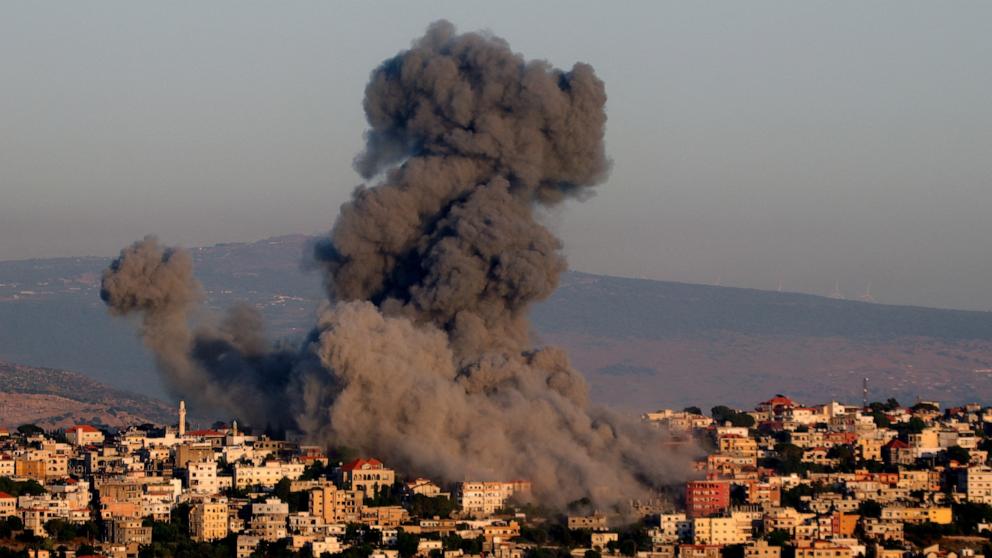Moscow’s war aims to destroy the Ukrainian people and culture – The Militant

When Russian President Vladimir Putin launched his invasion in 2022, he minced no words when he declared that Ukraine was not really a nation and had no right to be one. “Modern Ukraine was created completely and utterly by Russia,” he said. It was “an inalienable part of our own history, culture and spiritual space.” And he has fought the war on those principles, with attacks aimed at causing as much death and destruction as possible in Ukraine’s civilian-occupied urban centers.
Its aim is to break the determination of the Ukrainian people to fight for their independence. With this course, Moscow’s war has brought armed conflict to Europe on a scale not seen since World War II, affecting millions of Ukrainian workers with death, destruction and displacement.
Putin’s strategy relies on the Russian Federation’s larger population and reserves, his willingness to sacrifice them as cannon fodder on an unprecedented scale, and he expects to exploit the increasingly conflicting interests of Kyiv’s allies, most notably Washington.
Moscow landed a direct hit with a cruise missile on Ukraine’s largest children’s cancer hospital in Kyiv on July 8, killing seven people and wounding dozens. This was part of airstrikes on urban areas across the country that have killed at least 43 people and injured nearly 200.
“There may still be children, parents and medical staff trapped under the rubble,” said a statement from the Ukrainian Free Trade Union Federation released the same day. The union appealed to the international community “as Russia continues its terrorist attacks and genocide in Ukraine.”
According to the UN Human Rights Mission in Ukraine, May was the deadliest month for Ukrainian civilians last year, with at least 174 civilians killed and 690 injured.
Moscow is also targeting Ukraine’s power grid and other key infrastructure to compound the misery of civilians. Nearly half of the country’s energy production capacity has been destroyed, and it will take time to restore it. Water supplies, public communications and transport have also been disrupted. Daily power outages mean millions of people face a harsh winter without heating and other services necessary for survival.
Despite Moscow, life goes on
Not only are the people of Ukraine resilient, defiant and determined to prevail, but they also find ways to enjoy life despite the war.
The Arsenal International Book Festival in Kyiv attracted 35,000 visitors from May 30 to June 2. It was held in a 19th-century arsenal in the center of the capital. It has been held annually since 2011 and included over 160 book presentations and a musical tribute to Ukrainian writers killed by Moscow’s aggression.
Soldiers from various brigades at the front and writers who had volunteered to defend the country with weapons in hand gave lectures and manned stands. The participants were mostly young people who had to wait in long lines to get through security checks.
One stand displayed burnt books recovered from a May 23 attack on a Kharkiv printing house, one of the country’s largest. Russian missiles killed seven workers and destroyed 50,000 books. Moscow is waging war not only against the Ukrainian people, but also against Ukrainian culture and language.
In Kharkiv, Ukraine’s second-largest city, 30 kilometers south of the Russian border, where a new invading army was repulsed in May, life goes on despite the war. A street wedding celebration was taking place amid the air raid sirens. Just out of range of enemy artillery, actors rehearsed their lines in the Kharkiv Opera House while people enjoyed an afternoon concert in a windowless basement theater. All of the underground facilities now double as air raid shelters.
“Kharkiv will remain,” theatre director Armen Kaloyan told Washington Post. “We are indestructible. We will fight with what we are good at.”
Moscow bombs populated areas throughout the war. Civilian casualties rise as Moscow uses increasingly powerful glide bombs that cause significant damage. These are heavy Soviet-era munitions equipped with guidance systems that allow them to be fired from Russian airspace, beyond the range of Ukrainian air defenses.
The latest UN report also cites a number of cases of targeted “double-tap” attacks targeting the same location. The first missile to hit a civilian target attracts volunteer rescue workers and emergency responders, who are then hit by the second missile.
During World War II, the main imperialist allies, the US and Britain, set a precedent for Putin by targeting civilian populations in Germany and Japan. Working-class neighborhoods in German cities like Dresden and Hamburg were bombed wholesale, setting off firestorms that killed tens of thousands. US bombers did the same in Tokyo, not to mention the atomic bombings of Hiroshima and Nagasaki.
Resistance to Moscow’s war at home
The strategy of Moscow’s officer corps for months has been to press Ukraine’s defenders relentlessly, paying a high price in soldiers’ lives for small advances. In May and June, around 1,200 Russian soldiers were killed or wounded every day. They were sent in human waves, in what Ukrainian troops call “flesh attacks.”
Although the space for maneuver is shrinking in the face of increasing repression by the Russian regime, opponents of Moscow’s war continue to exploit Russian elections, which the Kremlin uses to assert its legitimacy. 83-year-old Lyudmila Vasilyeva ran for mayor of St. Petersburg, demanding that “the war must end immediately.” She has used her status as a survivor of the imperialist siege of Leningrad in World War II from 2014 to the present to protest against Putin’s wars in Ukraine.
In her campaign for the September elections, she was able to win over young supporters of the Dawn party, which was founded earlier this year by Ekaterina Duntsova, who is also an anti-war activist and was not allowed to run in the presidential elections in March.
About 6,800 voters defied Kremlin police pressure and came to Vasilyeva’s campaign headquarters to sign her anti-war candidacy. She was disqualified from the election at the end of June, but vowed to continue fighting. People thanked her for giving them the “opportunity to show that not everyone in Russia supports the war,” Vasilyeva said.



